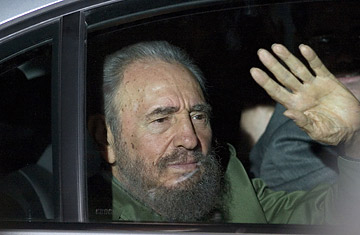
Fidel Castro waves to the press from the window of his BMW.
There's rarely anything newsworthy in the stultifying proceedings of Cuba's rubber-stamp National Assembly. But, perhaps for the first time in half a century, this Sunday's session actually packs some drama. The ailing, 81-year-old Fidel Castro this week announced his resignation after 49 years as President, declaring on Friday that he has promised himself a vacation. Now, the Assembly is expected to select his younger brother, Raul Castro, 76, as his successor. (Raul has served as interim President since the summer of 2006, when major intestinal surgery sidelined Fidel.)
But just as important as Raul's ascent is the question of which figures in Cuba's opaque leadership structure will rise with him — and who looks set to fade along with Fidel. To signal the passing of the revolutionary torch from old guard to new, the Assembly may select economy czar Carlos Lage, 56 — who shares Raul's visions of more capitalist, China-style reforms — as the First Vice President, making him the No. 2 man in Havana. Or the post could go to someone loyal to Fidel's more orthodox socialism, such as National Assembly Speaker Ricardo Alarcon, 70. That combination would strike a balance between the Raulistas and the Fidelistas while Fidel is still alive, but would also dull the prospects for meaningful political reform, at least until he dies.
Either way, most analysts predict the theme of the Assembly session will be youth — such as it is at the top of Cuba's communist power structure — especially the promotion of younger generals in the armed forces, which are still run by Raul and which control much of the economy.
Whatever emerges at the Assembly, Fidel Castro's resignation has opened up an unprecedented moment of political uncertainty — and competition — within the ranks of the ruling Communist Party. Herewith, TIME.com's guide to those among the Cuban elite worth watching on Sunday and beyond:
Fidel Castro: He may be stepping down as President and in ill health, but he's still a charismatic factor and still holds an important position in Cuba as head of the Communist Party. He retains a following on the island and is almost certainly pressing Raul to include some of his loyalists in the future government.
Raul Castro: Sunday's session is his coming-out party as Fidel's replacement as President of the Council of State, and perhaps also as President of the Council of Ministers (Cuba's Prime Minister). But despite 49 years as Fidel's No. 2 and military chief, Raul is a pragmatist who possesses none of his brother's bearded magnetism. Forging a legitimate bond with Cuba's 11 million people, as a result, is his toughest task — and how he orchestrates the new state hierarchy this weekend will be his first test.
Ramiro Valdes: Valdes is the most powerful Fidelista with whom Raul will have to deal. The 75-year-old former Interior Minister has been at Fidel's side since the Cuban Revolution was launched in 1953. He and Raul do not see eye to eye regarding reform, but they have to work with each other. Valdes is the Information and Communications Minister, whose purview includes control of the Internet in Cuba — a fairly important job in any modern totalitarian state.
